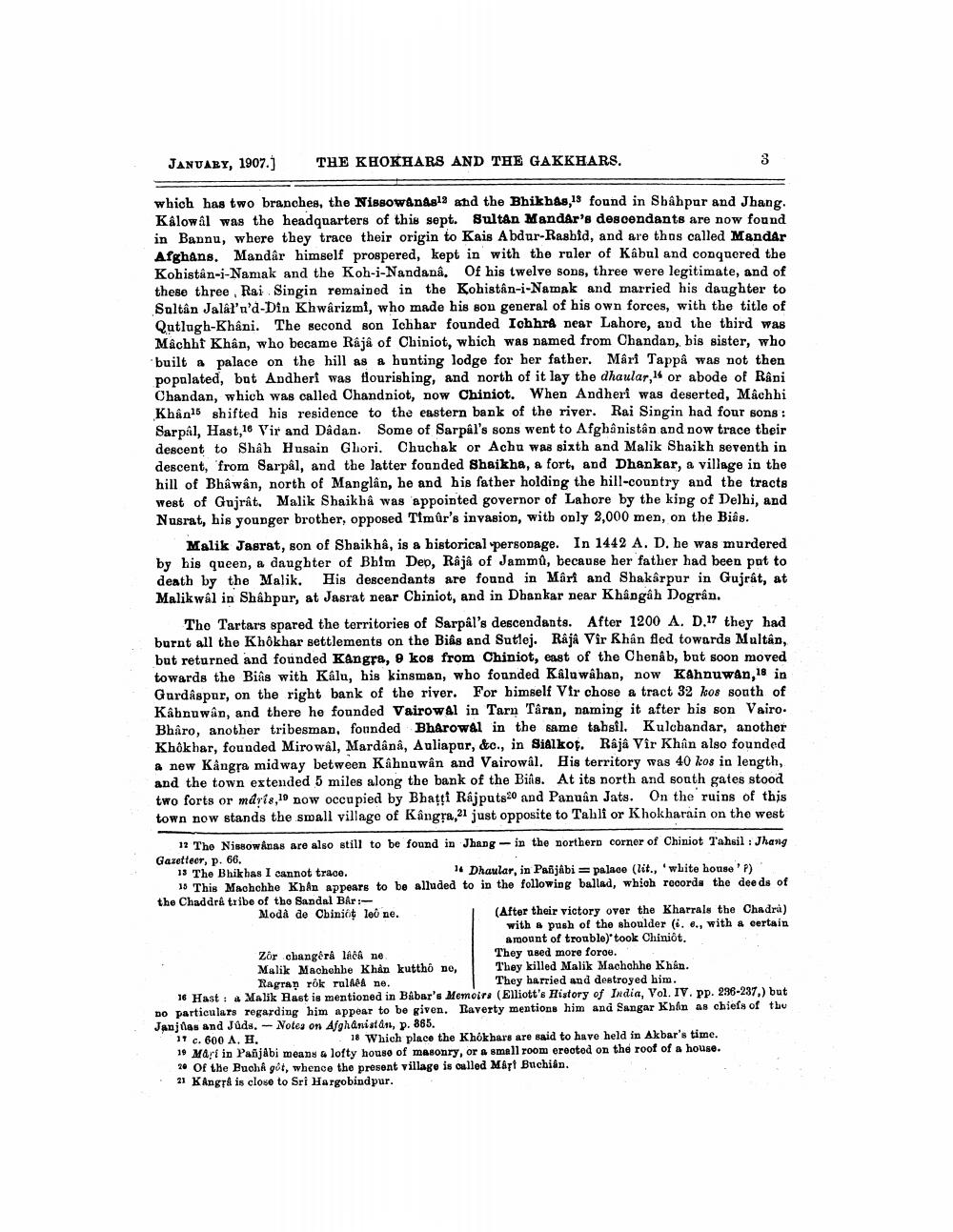________________
THE KHOKHARS AND THE GAKKHARS.
JANUARY, 1907.j
which has two branches, the Nissowanas1 and the Bhikhas,13 found in Shahpur and Jhang. Kalowal was the headquarters of this sept. Sultan Mandar's descendants are now found in Bannu, where they trace their origin to Kais Abdur-Rashid, and are thus called Mandar Afghans. Mandâr himself prospered, kept in with the ruler of Kâbul and conquered the Kohistan-i-Namak and the Koh-i-Nandanâ. Of his twelve sons, three were legitimate, and of these three, Rai Singin remained in the Kohistan-i-Namak and married his daughter to Sultan Jalal'n'd-Din Khwarizmi, who made his son general of his own forces, with the title of Qutlugh-Khâni. The second son Ichhar founded Ichhra near Lahore, and the third was Machht Khân, who became Raja of Chiniot, which was named from Chandan, bis sister, who built a palace on the hill as a hunting lodge for her father. Mâri Tappâ was not then populated, but Andheri was flourishing, and north of it lay the dhaular, or abode of Râni Chandan, which was called Chandniot, now Chiniot. When Andheri was deserted, Mâchhi Khân15 shifted his residence to the eastern bank of the river. Rai Singin had four sons: Sarpal, Hast,16 Vir and Dâdan. Some of Sarpâl's sons went to Afghanistan and now trace their descent to Shâh Husain Ghori. Chuchak or Achu was sixth and Malik Shaikh seventh in descent, from Sarpâl, and the latter founded Shaikha, a fort, and Dhankar, a village in the hill of Bhawân, north of Manglân, he and his father holding the hill-country and the tracts west of Gujrat. Malik Shaikhâ was appointed governor of Lahore by the king of Delhi, and Nusrat, his younger brother, opposed Timûr's invasion, with only 2,000 men, on the Biâs.
3
Malik Jasrat, son of Shaikhâ, is a historical personage. In 1442 A. D. he was murdered by his queen, a daughter of Bhim Dep, Raja of Jammu, because her father had been put to death by the Malik. His descendants are found in Mâri and Shakarpur in Gujrât, at Malikwal in Shahpur, at Jasrat near Chiniot, and in Dhankar near Khângâh Dogrân.
The Tartars spared the territories of Sarpâl's descendants. After 1200 A. D.17 they had burnt all the Khokhar settlements on the Biâs and Sutlej. Râja Vir Khân fled towards Multân, but returned and founded Kangra, 9 kos from Chiniot, east of the Chenâb, but soon moved towards the Biâs with Kálu, his kinsman, who founded Kaluwâhan, now Kahnuwan, 18 in Gurdaspur, on the right bank of the river. For himself Vir chose a tract 32 kos south of Kâhnuwân, and there he founded Vairowal in Tarn Târan, naming it after his son Vairo. Bhâro, another tribesman, founded Bharowal in the same tahsil. Kulchandar, another Khokhar, founded Mirowâl, Mardânâ, Auliapur, &c., in Sialkot. Râjâ Vir Khân also founded a new Kangra midway between Kâhnuwân and Vairowâl. His territory was 40 kos in length, and the town extended 5 miles along the bank of the Bins. At its north and south gates stood two forts or maris,10 now occupied by Bhatti Rajputs20 and Panuân Jats. On the ruins of this town now stands the small village of Kangra,21 just opposite to Tahli or Khokharain on the west
12 The Nissowanas are also still to be found in Jhang in the northern corner of Chiniot Tahsil: Jhang Gazetteer, p. 66.
13 The Bhikhas I cannot trace.
14 Dhaular, in Panjabi = palace (lit., 'white house?)
15 This Machchhe Khan appears to be alluded to in the following ballad, which records the deeds of the Chaddrâ tribe of the Sandal Bar:
Modà de Chiniot leû ne..
(After their victory over the Kharrals the Chadra) with a push of the shoulder (i. e., with a certain amount of trouble)" took Chiniot. They used more force.
They killed Malik Machchhe Khan. They harried and destroyed him.
Zor changêrà lâcâ ne.
Malik Machehhe Khan kutthô ne, Ragran rok rulê ne.
16 Hast a Malik Hast is mentioned in Babar's Memoirs no particulars regarding him appear to be given. Janjulas and Júds. - Notes on Afghanistan, p. 865.
17 c. 600 A. H.
18 Which place the Khokhars are said to have held in Akbar's time. 19 Mari in Panjabi means a lofty house of masonry, or a small room erected on the roof of a house.
20 Of the Bucha got, whence the present village is called Mart Buchiân. 21 Kangra is close to Sri Hargobindpur.
(Elliott's History of India, Vol. IV. pp. 236-237,) but Raverty mentions him and Sangar Khan as chiefs of the




